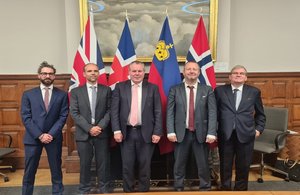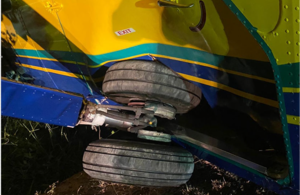Planned elections in Ukraine are a sham and invasion is failing: UK statement to the OSCE
Over these past months, we have seen the courage of the Ukrainian people; the adeptness of their military; and their unyielding commitment to their values under the most testing of circumstances. The United Kingdom is proud to call itself a partner – and a friend – of Ukraine.
The Ukrainian counter-offensive marks a new phase. But it is as solemn as it is welcome. To the international community, the Ukrainian flag symbolises bravery, freedom and democracy. To those in Izium, Balakliya, Kupyansk and the Kharkiv region, their national flag is not just a symbol – it is a lifeline. Because as the Ukrainian Armed Forces reclaim their territory, evidence emerges: reports of bodies showing signs of torture; reports of torture chambers; civilians, including children, amongst the dead. Beneath each wooden cross in Izium lies a human being, one who can no longer tell us what has happened to them. For the Ukrainian men, women and children whose stories will be told through post mortem, we promise justice.
Time and time again, Ukrainians have demonstrated the resilience needed to secure victory in their fight for peace. And yet President Putin falsely maintains that the Russian offensive in the Donbas remains on track. The world can see that he is lying. The Russian army, and the Russian leadership, is in panic mode. We see appalling acts of desperation: increased shelling of civilians and civilian infrastructure, including the dam at Karachunivske Reservoir and the Pivdennoukrainsk nuclear power plant at Mykolaiv. On 17 September, four medical workers were killed by shelling while attempting to evacuate their patients from a hospital in Strilecha, in Kharkivska Oblast. With Russian military actions in Bucha and Mariupol, we saw the very worst of humanity. By contrast, people like these Ukrainian medical workers, killed while saving lives, show us the best of it. We offer our deepest condolences to their families.
Meanwhile, President Putin’s proxies in the temporarily Russian controlled territories of Donetsk, Luhansk, Kherson and Zaporizhzhia Oblasts scramble to organise sham referenda – a pitiful charade. Let us be clear: we will never recognise any Russian attempts to purportedly annex part of Ukraine’s sovereign territory. These illegitimate referenda will not alter our approach. We will continue to support Ukraine’s right to defend its territory.
Putin’s sabre-rattling, and decision to mobilise parts of the Russian population is an admission that his invasion is failing. He continues to send tens of thousands of his own citizens to their deaths, ill equipped and badly led. We have seen reports overnight of over a thousand people arrested – another vicious assault on fundamental freedoms in Russia. And in Ukraine we have seen Russia’s deplorable attempts to replenish its ranks with convicts – qualified for little more than continuing the so-called “Special Military Operation” in the style in which it has been conducted thus far: with ineptitude and brutality. Ukraine must win; and we must ensure there is accountability and justice.
We join our partners in condemning the sentencing of Maxim Petrov and Dymtro Shabanov by an unrecognised and illegitimate court in the so-called Luhansk People’s Republic. As the OSCE Chair-in-Office and Secretary-General have repeatedly made clear, SMM national mission members were detained for simply performing their official duties – duties mandated by all 57 participating States. Russia is solely responsible for these actions, and we call for the immediate and unconditional release of our OSCE colleagues.
Indeed, the UK holds the Russian Federation responsible for the safety and welfare of all Prisoners of War and detained civilians in the non-Government controlled areas of Ukraine. 5 British Nationals and 5 other foreign nationals held by Russia-backed proxies are being safely returned. Russia must end the ruthless exploitation of prisoners of war and civilian detainees for political ends.
I join my Ukraine, US and EU colleagues in condemning the sentencing yesterday of the Deputy Leader of the Crimean Majlis Nariman Celâl, as well as Asan Akhmetov and Aziz Akhmetov. Mr Chair, we stand with Ukraine for the long haul, which is why my Prime Minister has vowed to match the UK’s 2022 military support to Ukraine in 2023. Russia must withdraw all of its troops from the entire territory of Ukraine, within its internationally recognised borders.


